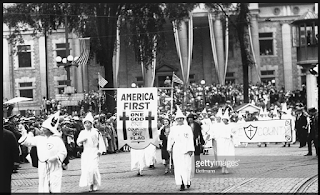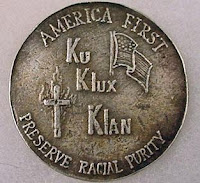I have neither the intellectual
rigor nor academic credentials to claim the label “historian,” or really even “history buff.” Still, I do know
stuff, a lot of it history from teaching and preparing to teach various courses.
Maybe I can claim “history dilettante,” which kind of fits my approach to so
many things.
Nevertheless, on the 4th
of July, I am disturbed by the number of people willing to ignore history, the
number of people willing pretend history doesn’t matter, the number of people
willing to twist history to fit their world view and agenda.
This holiday in particular seems
to inspire people.
Conservatives proudly wave their
flags and tout their beliefs, failing to recognize that the history of
conservatism is the story of people swimming against the tide. In their time,
conservatives opposed declaring independence and the American Revolution
(Tories), ratifying the Constitution (anti-Federalists), abolition, passage and
enforcement of the Civil War Amendments, women suffrage, organizational rights
for workers, social security, social integration and Brown v. Board, the Civil
Rights and Voting Rights Acts, civil rights protections for all people…. Change
is scary and conservatives play an important role in making people slow down
before adopting ill-conceived (even if usually well-intentioned) proposals without
considering the inviolable Law of Unintended Consequences. But conservatives have consistently been on the wrong side of history. You can’t truly own your political philosophy
without also owning its historical roots.

And then
there’s the just plain “bad” history. Although I reject that the Civil War, at
its core, was about anything other than preserving and expanding slavery, I
recognize the deep roots of the “lost cause” school. I also “know” that its
goal was to transform sedition into nobility, but understand why others might
reject that view. Today, however, someone said slavery was incidental and the true
cause was taxes. Fortunately for my self-esteem, I do not know and did not
teach this person; and my goal here is not to create a lesson on the cause(s) of
the Civil War. I’ll just end with what I was tempted to say, the variously (and apparently often incorrectly)
attributed quote, “It is better to remain silent at the risk of being thought a fool than to talk and remove all doubt of it.” I obviously do not always heed my own advice.
Happy July 4, 2018.
